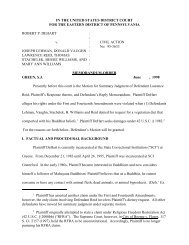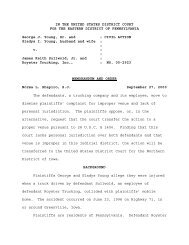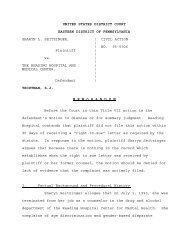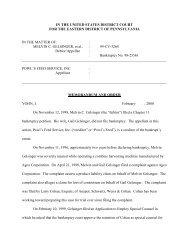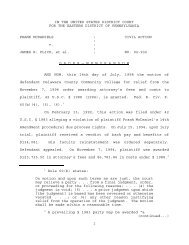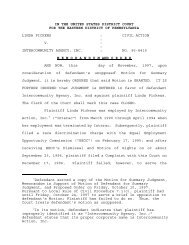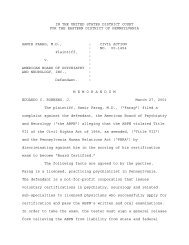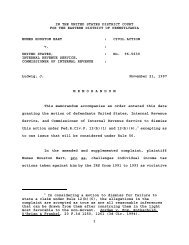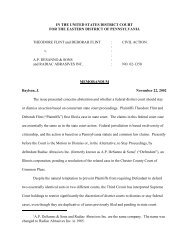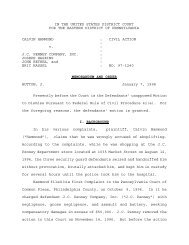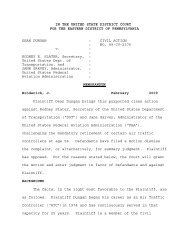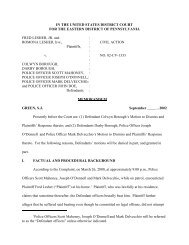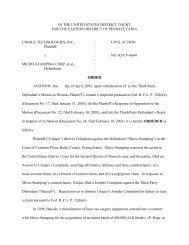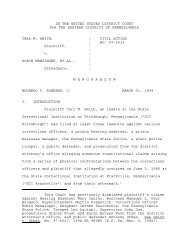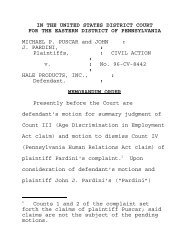united states district court - Eastern District of Pennsylvania
united states district court - Eastern District of Pennsylvania
united states district court - Eastern District of Pennsylvania
Create successful ePaper yourself
Turn your PDF publications into a flip-book with our unique Google optimized e-Paper software.
The Court must first determine whether the contract is ambiguous. 4 Where the<br />
written terms <strong>of</strong> the contract are not ambiguous and can only be read one way, the Court will<br />
interpret the contract as a matter <strong>of</strong> law. 5 The parties do not argue that the Agreement is ambiguous,<br />
and the Court agrees.<br />
1. Whether the Agreement Is Illusory<br />
First, Starad argues that the Agreement is illusory because QVC’s performance is<br />
discretionary. 6 When one party’s obligations under a contract are discretionary, those obligations<br />
are “illusory and, therefore, lacking consideration and unenforceable.” 7 As pointed out by QVC, the<br />
Agreement is not illusory because it sets out the parties’ mutual promises regarding a license<br />
agreement. Furthermore, under an exclusive dealing arrangement such as the one here, the buyer has<br />
a duty to use its best efforts to promote the seller’s product (and the seller has a duty to “use best<br />
efforts to supply the goods”). 8 Therefore, Starad is not entitled to summary judgment on this claim.<br />
4 Hullett v. Towers, Perrin, Forster & Crosby, Inc., 38 F.3d 107, 111 (3d Cir. 1994) (a contract<br />
provision is ambiguous if it is susceptible <strong>of</strong> two reasonable alternative interpretations).<br />
5 Id., 38 F.3d at 111.<br />
6 The Agreement at 2(c), 4(a) (QVC “makes no representations or warranties regarding (i) the number <strong>of</strong><br />
Products that QVC will purchase, if any, (ii) the frequency, if at all, that the Products will be <strong>of</strong>fered for sale by<br />
QVC, and (iii) the amount, if any, <strong>of</strong> revenues that will be generated from such sales,” how frequently Radko would<br />
appear on QVC to promote the Products, and reserved the right to promote products competing with the sweaters).<br />
7 Starr v. O-I Broadway Glass, Inc., 637 A.2d 1371, 1373 (Pa. Super. Ct. 1994).<br />
8 See Tigg Corp. v. Dow Corning Corp., 962 F.2d 1119, 1125 (3d Cir. 1992) (citing U.C.C. § 2-306(2)).<br />
Tigg applied Michigan law corresponding to Article 2 <strong>of</strong> the Uniform Commercial Code (the “U.C.C.”). Starad<br />
agrees that Article 2 <strong>of</strong> the U.C.C. applies to exclusive license agreements. See also 13 Pa. Cons. Stat. Ann. § 2306<br />
(corresponding to U.C.C. § 2-306); Starr, 637 A.2d 1371, 1373 (purchaser’s performance was not discretionary<br />
where it was contingent on his ability to procure property <strong>of</strong> a third party because the purchaser had a “duty to make<br />
reasonable efforts to bring about the transaction.”). Starad argues that even if QVC had obligations under the<br />
Agreement, QVC failed to use its best efforts because it issued purchase orders for less than one-sixth <strong>of</strong> the amount<br />
contemplated by the Agreement, ten months after its execution, while doing nothing to promote the sale <strong>of</strong> sweaters.<br />
While the parties present conflicting affidavits on the issue <strong>of</strong> QVC’s best efforts (Radko Aff. 20, 24; Becchelli<br />
-7-



